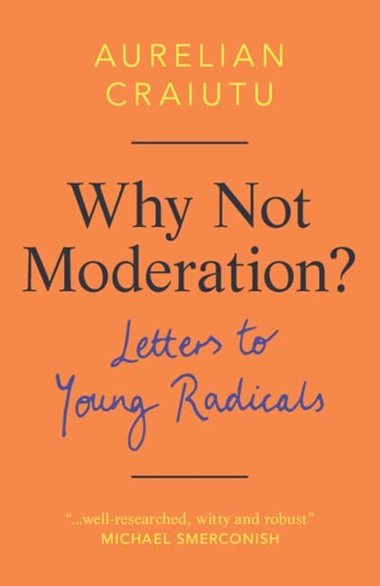
Version 1.0.0
In an age of polarization, the most rebellious posture is that of moderation.
In a time of religious and cultural division, the most hopeful theological posture is that of moderation.
I recently read a compelling book by a Professor of Political Science named Aurelian Craiutu, Why Not Moderation? Letters to Young Radicals. Craiutu argues that moderation is stronger, more courageous and more hopeful than polarization.
As I read Craiutu’s reflections, I considered the place of faith and the church in our culture. How have some expressions of Christianity contributed to a culture of polarization? Why might ‘radical moderation’ be the most hopeful way forward?
A friend of mine who works in health care used to have a job interestingly titled ‘Patient Flow Coordinator.’ The flow in question referred to the assignment of patients around the hospital. What ward, what room, when would they be discharged, who was admitted, etc?
My friend was good at her job, but she told me that one pressure she felt was the reality that almost every decision she made resulted in more people being upset than being pleased.
This was due to the understandable fact that in a hospital most patients are focused on their reasons for being there, not necessarily on the needs of the other patients. When the system is under stress, there is less and less ability to please all or most patients.
Similarly, people can be drawn towards self-focused and polarized religious and political silos in a world under stress, Political and religious leaders might find that, like a Patient Flow Coordinator, almost every decision made results in more people upset than pleased. As people become polarized in their views, even those who help to guide their churches or organizations or political parties can feel pressure to make decisions that increase rather than decrease the polarization.
This is the place in which moderation becomes a rebellious concept. When everyone is retreating to their places of apparently secure polarization, moderates offer a more hopeful path.
“Without the great political virtue of humility, patience and moderation, every person in power becomes a ravenous beast of prey.” (John Adams)
You might think back to times in your life, perhaps at a church camp or youth rally, when you heard an altar call. The chances are that there was some kind of injunction towards a radical, all-out kind of decision. “Give Jesus your all” meant things like throwing out your secular music or recommitting your life because you had failed in the past year to be a truly, fully committed follower. True commitment implied a cultural polarization.
We ought not extol the kind of moderation that Martin Luther King famously warned against or the spew-worthy lukewarmness mentioned in Revelation about the church in Laodicea. I am not arguing for half-hearted devotion to the people and things that matter most to you.
I am arguing that the strongest kind of devotion is marked by moderation, not polarization. It is more often a lack of faith, not a presence of faith that leads to polarization. We become unquestionably committed to our way of seeing things because, with anemic faith, questions and humility become dangerous to the whole edifice.
In the early days of Billy Graham’s evangelistic ‘crusades’ (how’s that for a word that sounds troublingly ancient in retrospect?) theologian Karl Barth – who apparently quite liked Graham – expressed dismay at the “You could leave here and get hit by a bus tonight” kind of altar call tactic that Graham regularly employed. In reflecting on the method, Barth said that “the gospel cannot be presented at gunpoint.” If the gospel is presented at gunpoint – you will burn in hell if you don’t believe – then it ceases to be the gospel.
For many of us who grew up in an evangelical religious culture, it is hard to conceive of a way of inviting people to faith that does not include some kind of variation of such a threat. How might we help one another hear the loving address of God, even when the social, political and personal stakes are high? Perhaps we can see that Jesus himself rejected polarization and fear.
I sometimes play a thought game that I suppose is a strange kind of prayer. I take a portion of scripture like Philippians chapter 2 and engage in a conversation with Jesus about it. This might seem weirdly religious, but I experience it as playful and spiritually helpful.
I quote the passage, “Let the same mind be in you that was in Jesus Christ, who, though he existed in the form of God, did not regard equality with God something to be grasped, but emptied himself, taking the form of human likeness . . .” I then ask Jesus, “Should you have done that? Wouldn’t your being God and all demand that you grasp harder to that nature? Would I even know you, would we be having this interaction if you stayed immovable, polarized?”
Craiutu quotes David Brooks of The New York Times, who said that moderation is often not pursued because there is a common assumption that it lacks a “magnetic idea.” It is easier to pull people towards the poles of their own ways of seeing than towards other people who see things differently.
I was speaking with my friend David Goa recently. David is a writer, professor and theologian within the Orthodox tradition of Christian faith. He has done some beautiful and faithful work across religious lines. He was talking about the pain he feels for his Jewish and Muslim friends given the conflict in Gaza and Israel. He described his sorrow with these words: “When everyone is right and everyone is righteous, that is the landscape of evil.”
Returning to metaphor, from the world of health care, I sometimes think about the religious and spiritual equivalent to what is called ‘iatrogenic infection.’ The term refers to infection or illness picked up within a system of health care. Visit any hospital and you will see signs all over about preventing infection from spreading within the health care setting.
One of the hopeful exercises we can take up in religious communities is to be honest about the iatrogenic cultural and religious illness that has been spread in church and theology. Too often we reward polarized interpretation and practice of faith.
We often allow people who are given to moderation to pick up the idea that their faith is somehow weaker than the faith of the fearful radicals. We often promote to leadership people who are most, not least, polarized in their thinking because we make the mistake of thinking that the most polarized people are the most committed to the faith.
It might sound churchy and religious, but I hold as a prayerful consideration that Jesus, in moving towards us and moving us towards others, might be a ‘magnetic idea’ of the sort that Brooks mentions.
It is moderation that is firm and strong and courageous. Moderation is open to nuance, open to consideration of the view of the other person. Moderation moves us towards others rather than away from them and this reflects the way of Jesus Christ.

Todd Wiebe
Some of what people have experienced as reticence about faith, even their own faith, is a suspicion that they are being called to be radical in a polarized way and that other ways of faith are less than truly faithful. Might I suggest that you let go of the idea that your faith is weaker because it is more moderate?
A revolution of moderation might just be the hope of the church and the world.
Todd Wiebe is Director of the Reflector Project, a non-profit organization focused on hopeful theological renewal. He is Teaching Pastor at Cap Church in North Vancouver, co-host of the podcast Rector’s Cupboard and writes a substack newsletter called, Evangelically Departed.
He has written this comment as a member of The Bell: Diverse Christian Voices in Vancouver.

A powerful and much needed message. Thank you.
Thank you, Rev. Steve.
Blessings in your vocation.